A passion for philanthropy powers Alpha Omega vintners
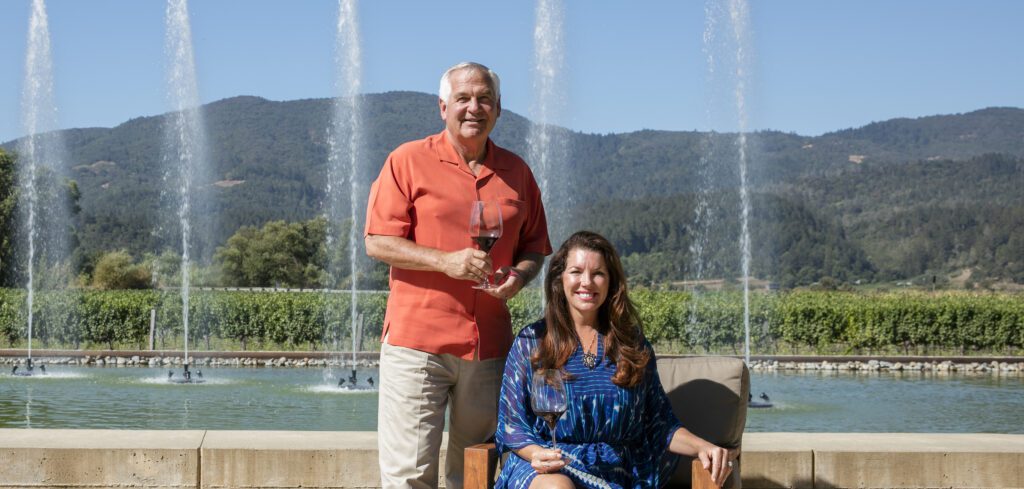
Nearly 15 years ago, Alpha Omega winery owners Robin and Michelle Baggett glided into Napa Valley from San Luis Obispo, their hearts of gold exposed for all to see. It didn’t take long for the unknown, starry-eyed vintners to develop a reputation not just for the world-class wines produced at their new, blockbuster winery on the Rutherford Bench, but also for their eagerness to contribute to the community they now called home. Their days are full, balancing their winery responsibilities—he is managing partner and she oversees marketing and the Alpha Omega Foundation—and “Zooming” from one board meeting to another, but they wouldn’t have it any other way. Robin, who hails from Salinas, relies on his trusty pocket calendar to keep track of his schedule. He’s chair of the Napa Valley Vintners’ board and vice chair of Festival Napa Valley, and he sits on the boards of the Wine Institute, Land Trust of Napa County, First Tee of Monterey County, and the Cal Poly Athletic Director’s Council. Michelle, a Marietta, Georgia native known as much for her creativity as she is her vivaciousness, serves on the boards of the Rutherford Dust Society and the St. Helena Hospital Foundation. They exude the same warmth that permeates through their farm-style winery. Passionate about supporting charities focused on children’s education, medical technology, and community needs, this couple strives to leave the world a better place than they found it.
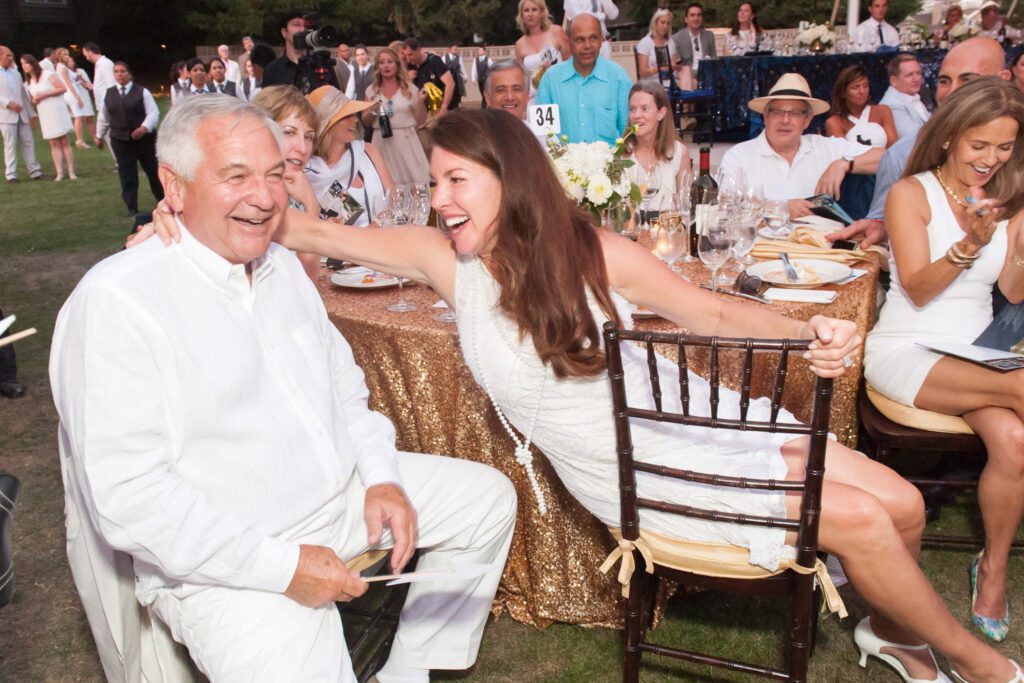
How have Napa Valley Vintners and the Wine Institute been instrumental to their members during the pandemic?
Robin: The biggest thing both organizations have done is work with our government officials on the national, state, and local levels to come up with guidelines and methods on how we can continue to operate our wine businesses safely, as well as outside dining at restaurants on city streets. Those were all negotiated with the Wine Institute and NVV. As a member of both boards, you can’t say enough good about what both have done in this respect. They have worked their tails off.
Michelle: All of this came on the heels of an NVV trip to Washington, DC, in February to lobby for the wine industry. We had a lot of discussions and discoveries during that trip and said we needed to get ahead of this. We were very fortunate to be a part of that contingent. Before Governor Newsom closed all wineries, we identified our first plan of action was to work with our COO to create a strategy to keep our staff employed should we have to close the winery. We accomplished that. My husband took the draft of protocols to our COO and asked him, are these all doable and do you have any more ideas to supplement these? Before Governor Newsom and Napa County gave wineries the green light to open, we had already restaged our entire outdoors with seating at a distance well above what is required and met with our team for intense training on the mandated protocols, so we were two weeks ahead of the game.
“Before Governor Newsom closed all wineries, we identified our first plan of action was to work with our COO to create a strategy to keep our staff employed should we have to close the winery. We accomplished that.”
Michelle Baggett
Napa Valley Vintners continues to be a leader in the community.
Robin: I’ve been very proud of what Napa Valley Vintners has done this year. Although its signature fundraising event, Auction Napa Valley, was canceled, NVV still pledged to make donations at least equal to last year’s giving. That’s pretty impressive, considering NVV has donated $200 million to community health and children’s education over the past 40 years. The money will come from a reserve fund the NVV established years ago. It was set up for circumstances just like this, so those charities and nonprofits that we have supported throughout the years wouldn’t go without. We also invested in several endeavors to bring COVID-19 testing to Napa.
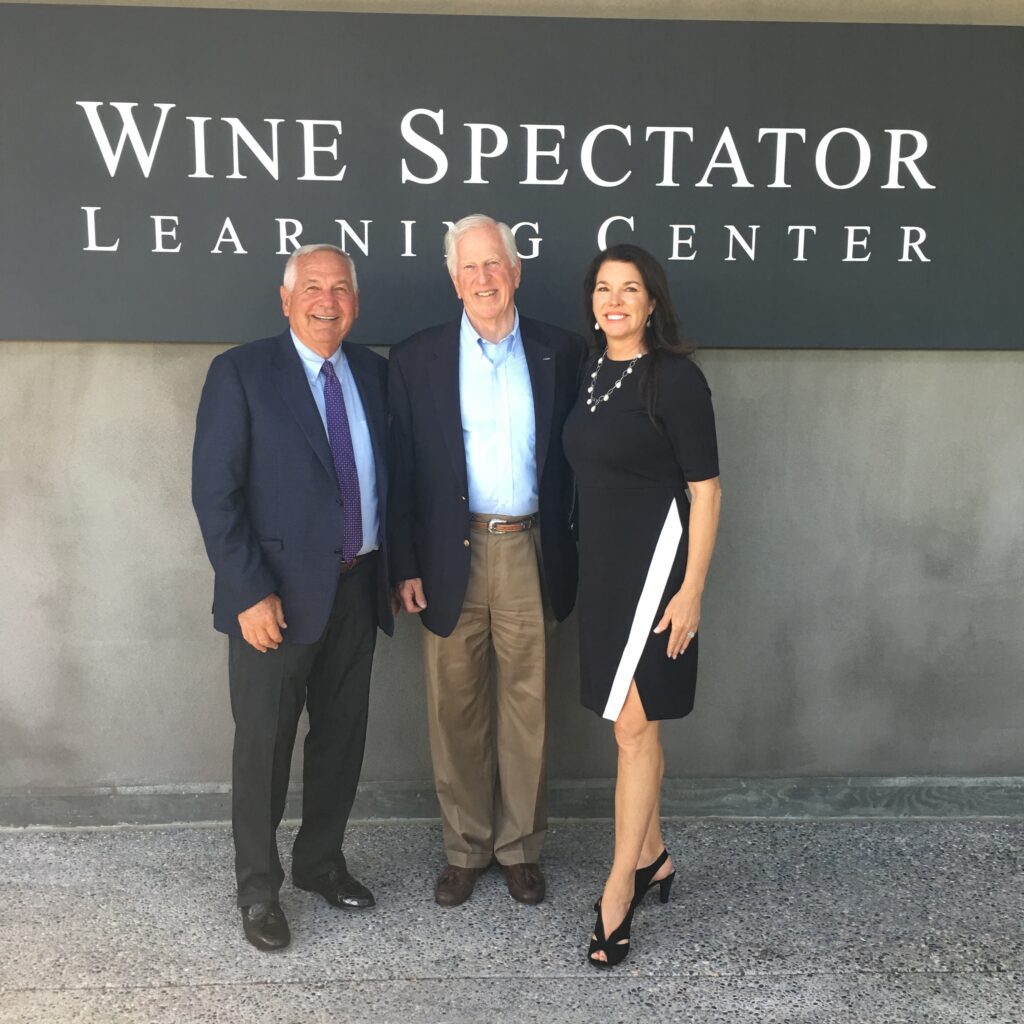
What other good work are you up to these days?
Robin: We recently joined with nine other wineries to produce a special wine with the goal of grossing $4.5 million for the Napa Valley Vine Trail Coalition which is building a 47-mile path from Vallejo to Calistoga. Each winery is donating three barrels of wine that will be sold over the next five years, beginning this fall. Everything is being donated from the bottles to the corks to the etching. It’s a novel approach to fundraising and a collaboration that, hopefully, is finally going to get the Vine Trail across the finish line.
Michelle: Why is that important? It is not curing an illness or feeding a family or helping children through education—all causes we support—but it is mental and physical health for our community, visitors, and Mother Earth. The more people who are biking means fewer people in their cars, resulting in a lower carbon footprint. Plus, the Vine Trail is much safer than having people ride their bikes on the highway.
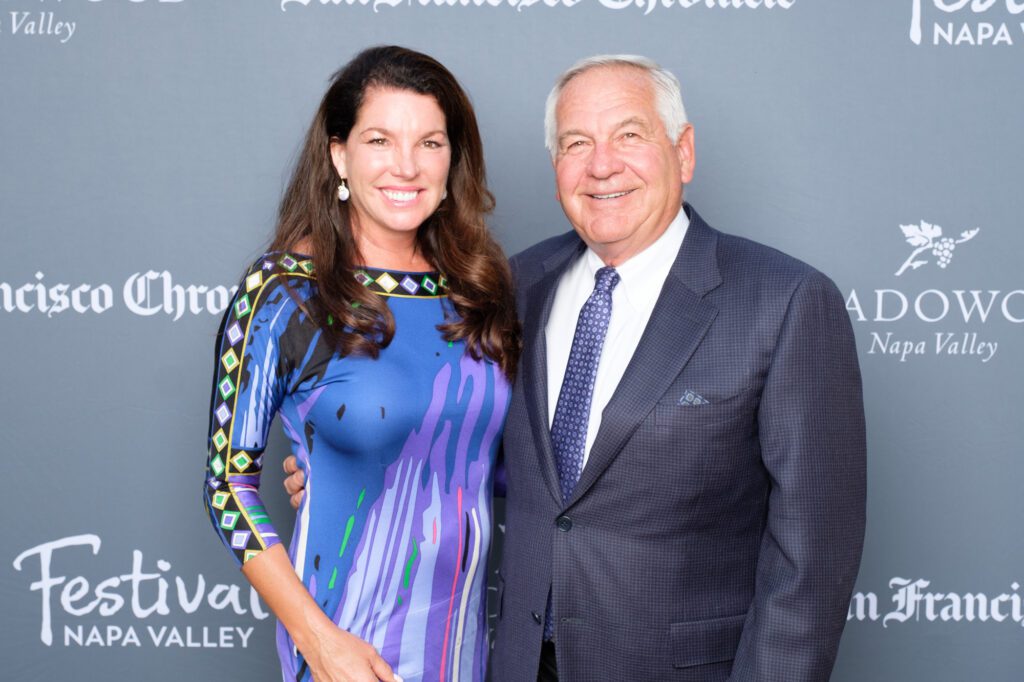
How do you select which charities to support?
Michelle: I like to diversify. First, we look within our community. NVV raises enough money to be able to support a lot of our local community’s foundations and charities. So, there is a broad bandwidth and that’s very appealing. Being on the St. Helena Hospital Foundation board is important to ensure that we have the most updated technology and finest doctors in the Bay Area to be able to take care of our community, so that they don’t have to travel outside of the county to get cancer treatment, cardiology support, or hip and knee replacements. St. Helena Hospital scores at a very high level in cardiology and joint replacement and has its own Martin-O’Neil Cancer Center which provides multi-disciplinary cancer care from medical oncology, chemotherapy, and surgery to advanced radiation treatment. Since we both lost our moms to cancer, the V Foundation Wine Celebration introduced us to a new way to support cancer initiatives through cancer research. Research is so important in the fight to beat cancer. Also, the V Foundation has a 4-star (highest) Charity Navigator award for financial health, accountability, and transparency. It gets better: 100 percent of the funds raised through donations go directly to cancer research!
We love music. Robin and I both grew up in musical families. Music and arts are so important for children’s development. Music is math and math is science. Arts education is really education in so many different arenas. We are also big supporters of The First Tee of Monterey County, part of an international youth development organization that introduces the game of golf and its inherent values to young people.
Where does your desire to give back come from?
Michelle: I come from a Christian—Baptist—family and, as a little girl, remember digging in my purse for a dollar when the offering plate would come by. It’s growing up in that environment of learning to support other people—and that starts within your family, then leads into your community where you do things like go across the street to help a neighbor take groceries inside. You see a smile on someone’s face whom you’ve helped, and you just want to do more. Sometimes, you feel like you can’t do enough and some people feel like they are not going to make a difference, but every little thing you do makes a difference in someone’s life. My first charity I participated in was March of Dimes. As a little girl in elementary school, I did a March of Dimes walk. I was sunburned and exhausted after my tiny legs walked 20-plus miles, but it felt good to be raising money and helping an unknown. We all have value!
Robin: I also grew up in a very Christian, Baptist family. We were taught early on it was better to give than to receive and to live by the Golden Rule of do unto others as you would have them do unto you. That was ingrained in me from day one. The only thing I’ve added to that is to leave this earth a better place than we found it. A lot of things that we do, such as with the Land Trust of Napa County and the environment, are because of this motto.
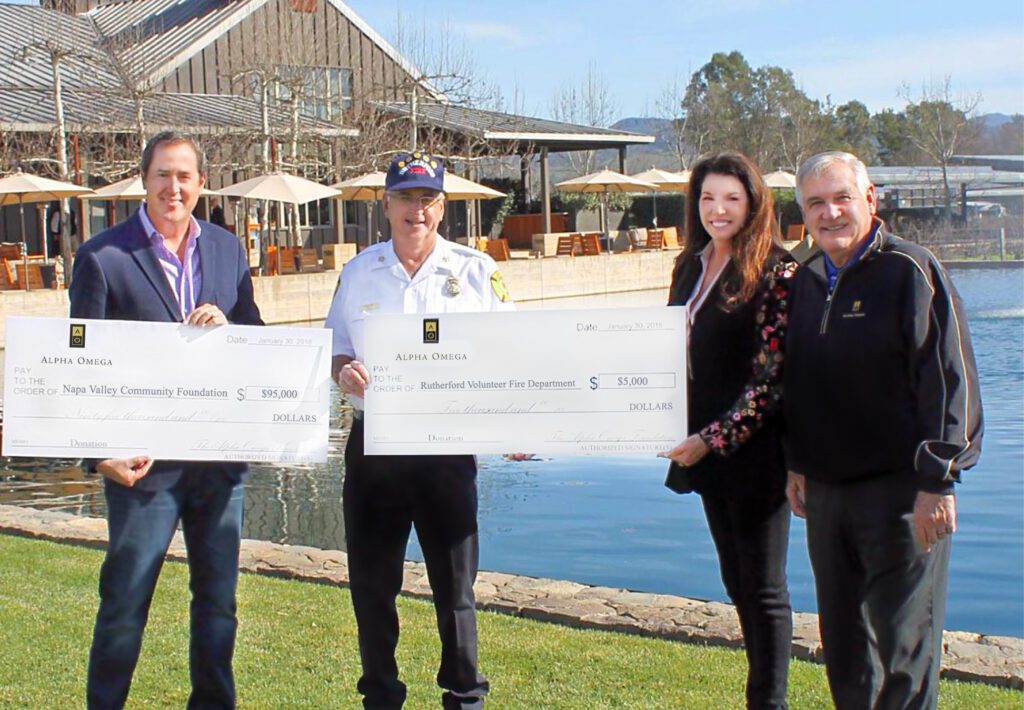
How did you begin using your smokers for charity?
Robin: It all started when serving on charitable boards and seeing that half the proceeds for events would go to the caterer and not to the foundation. We decided to create the Baggett Ranch BBQ Team to cook the food which we cover the cost of. We have 10 commercial smokers that are used for charitable purposes, such as when we annually host the Festival Napa Valley finale, participate in the V Foundation Wine Celebration’s Marketplace, and feed people affected by fires. During the Northern California wildfires in 2017, we helped prepare 33,000 meals for emergency personnel and evacuees. After the fires, we put on two Big Bottle BBQ benefits that raised $100,000. We gave 100 percent of that to the Napa Valley Community Foundation and the Rutherford Volunteer Fire Department. For the past two years, we’ve donated our manpower and/or equipment to help feed people in disaster areas. We’re so pleased to be able to do this.
The Alpha Omega Foundation’s mission is to inspire and encourage charitable giving in the next generation of Napa Valley’s leaders. How are you going about that?
Michelle: One of the things we do with our foundation—which, by the way, doesn’t use any donated funds for administrative or fundraising costs and, therefore, donates 100 percent of everything we raise—is emphasize the importance of donating your time. You don’t have to be financially wealthy. It’s asking your favorite restaurant owner if they would donate a lunch for someone at the Rianda House, a senior activity center in St. Helena, because you want to take someone out to lunch. There’s a lot of value in being able to help someone who lost their job by offering to fill their pantry or gas tank. Giving back encourages others to pay it forward.
